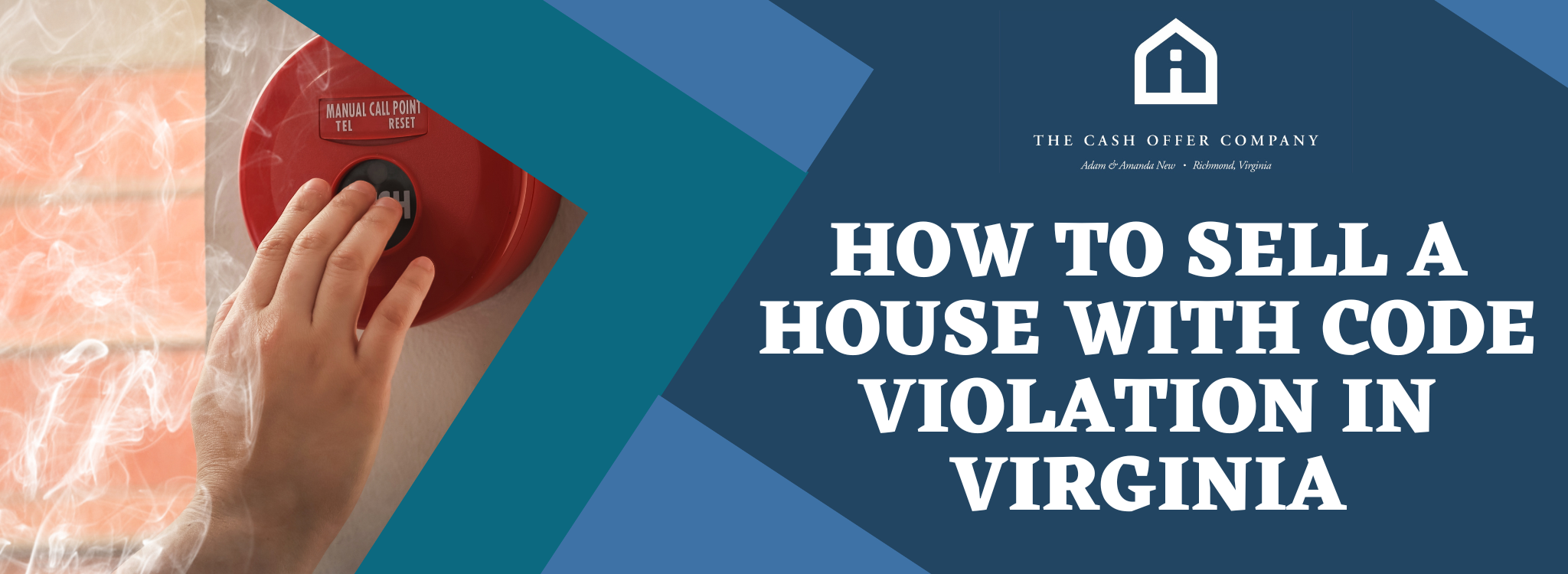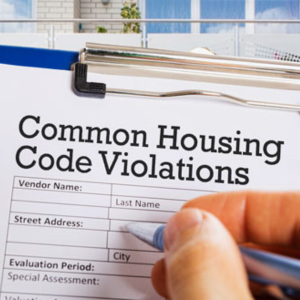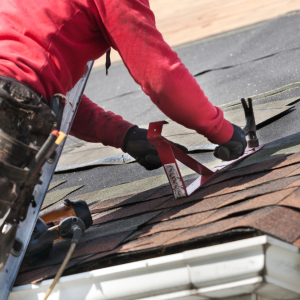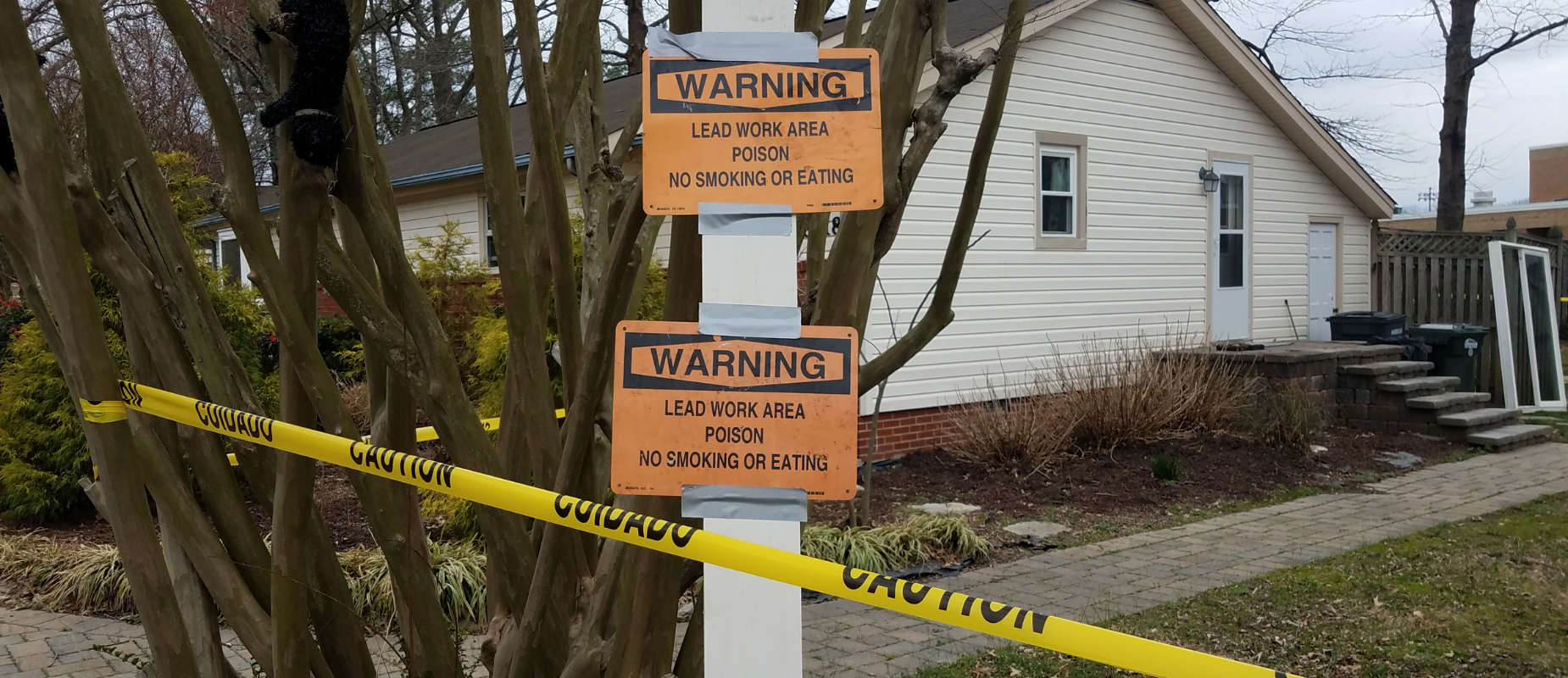
Understanding Code Violations in Virginia & Their Impact on Selling Your House
In Virginia, to sell a house, you must do more than just get a buyer. You must ensure your home complies with all municipal regulations. Code violations can have a serious impact on a house’s value, marketability, and the selling process. Here, we talk about common code violations, how they affect sales, and what you need to say about them.
What are common code violations in Virginia homes?

In Virginia, homes must comply with many rules, including electrical, plumbing, and building codes. Some common violations are:
- Electrical Code Violations: These may involve outdated wiring or improper installations that do not meet safety standards.
- Plumbing Code Violations: Non-compliant fixtures or poorly installed pipes can lead to major inspection issues.
- Building Code Violations: Structural flaws or unauthorized changes can result in serious violation notices.
Regarding compliance inspectors, these officers will issue compliance violation notices due to failed inspection reports. Notices will require homeowners to revise areas that violate safety and compliance requirements.
How do code violations affect a home’s value and marketability?
Code violations can discourage potential buyers and affect a property’s appeal in the housing market. Effects include:
- Reduced Property Value: Buyers often see violations as risks, leading to lower offers.
- Decreased Marketability: Non-compliance can make it harder for sellers to attract interest.
- Negotiation Challenges: Violations prompt buyers to ask for lower prices, affecting overall pricing strategies.
Addressing these issues before listing your home can improve both value and marketability.
What are my legal obligations regarding disclosure of code violations in Virginia?
Virginia law requires sellers to disclose known code violations to potential buyers, ensuring honesty in real estate transactions. Obligations include:
- Compliance with Disclosure Laws: Failure to disclose known violations can result in legal issues and contract disputes.
- Consulting an Attorney: Work with a real estate attorney to understand your legal obligations and ensure accurate disclosures.
As a seller, you have specific obligations regarding the details you need to share with prospective buyers, and the process of selling a house can be easier for buyers if you address and disclose any potential violations.
Assessing and Addressing Code Violations
How can I get my property inspected for code violations?
Ensuring your property complies with building codes is important to avoid legal issues and maintain safety. In Virginia, here’s how you can get your property inspected for code violations:

- Understand the Process:
- For information about inspection services, call your local building department.
- Fill out any required application forms and be aware of the requirements for your property type.
- Schedule an Inspection:
- Schedule an inspection with a licensed inspector. It is wise to attend the home inspection to address any pressing issues.
- Assessment and Outcome:
- You’ll receive a report after the inspection, outlining any code violations. The report will offer recommendations for compliance and will likely state if additional permits are required.
- Compliance and Permits:
- Obtain the required licenses to address any violations found. Ensure that all work complies with Virginia’s building rules.
Following these steps helps you manage your property’s compliance and avoid costly penalties.
How much will it cost to repair code violations?
The cost to fix code violations varies based on factors such as the nature of the violations and the required repairs. Here’s how you can manage these expenses:
- Cost Estimation:
- Get quotes from several companies to gauge the cost of compliance
- . Add up the costs of the supplies, the work, and the permits and inspection fees.
- Budgeting:
- Prepare a budget that accounts for both planned and unexpected costs. Save some extra money in case something unexpected comes up.
- Negotiation with Contractors:
- Consult contractors about pricing. Evaluate estimates and reviews to guide decisions.
- Remediation Steps:
- If funds are tight, deal with minor issues temporarily. Prioritize more serious repairs first, as these will help you budget more effectively.
Addressing code violations promptly maintains property value, ensures compliance, and promotes safety.
Are there any financial assistance programs available for code violation repairs in Virginia?
Covering the cost of code violation repairs can be difficult, but several financial assistance programs in Virginia may help:
- Government Programs:
- Research state and local government funding opportunities (grants/low-interest loans) that help homeowners with compliance with building codes.
- Funding and Support Options:
- Investigate organizations and charities that provide financial assistance for home repairs and renovations that comply with code.
- Eligibility Criteria:
- Review eligibility criteria as they may vary based on income, property location, and the nature of the violations.
- Application Process:
- Apply by gathering the necessary documents and submitting them by the deadlines. Accuracy can enhance your application’s chances of success.
The financial aid search can help you alleviate some of your burdens associated with fixing code violations and keeping your property safe and in compliance. For further assistance, contact your property’s compliance experts.
Strategic Options for Selling Your Virginia Home with Code Violations
Should I repair the violations before listing?
When selling your house in Virginia with code violations, deciding whether to fix them before listing can affect both property value and marketability. Here’s what you need to know:

- Cost vs. Benefit: Assess repair costs against the potential appreciation in the property’s value. Some improvements may be inexpensive but could transform the house’s overall appearance.
- Risk Assessment: If you don’t fix violations, buyers might be scared away or make cheaper offers. Fixing them doesn’t always mean better returns, though, especially when market conditions aren’t right.
- Inspection Readiness: Identifying major breaches from a pre-listing inspection may help to comply with local regulations.
- Decision-making: Sellers should balance the benefits of compliance with potential risks. Consulting a real estate expert in Virginia can offer guidance specific to your circumstances.
Can I negotiate with buyers to address violations after closing?
Negotiating with buyers to handle code violations after closing can be useful. Consider the following points:
- Negotiation Strategy: Sellers can propose credits or price reductions to encourage buyers to take on repairs post-closing.
- Contractual Agreements: Clearly outline agreements in the contract to avoid future conflicts. Full disclosure is important for successful negotiations.
- Closing Process: Determine whether credits will be applied at close or later as an adjustment made after the settlement. With legal help, this process can go more smoothly.
- Buyer-Seller Agreement: Work with the buyer to find a solution that satisfies both parties and ensures comfort with the outcome.
What are the advantages and disadvantages of selling “as-is” to a cash buyer?
Selling your house “as-is” to a cash buyer in Virginia has its pros and cons:
- Advantages:
- Quick Transaction: In places where things aren’t sure, cash deals often close faster because they offer speed and certainty.
- Avoid Repairs: Selling as-is means you don’t have to finance repairs, making it appealing if resources or time are limited.
- Legal Simplicity: Since the buyer agrees to violations that are already happening, compliance issues go down.
- Disadvantages:
- Pricing Considerations: As-is homes usually receive lower offers due to perceived risks and necessary fixes.
- Market Impact: Current market trends and the state of the house affect how many cash buyers are interested.
- Due Diligence: Cash buyers usually conduct detailed inspections and may renegotiate or even cancel deals due to undisclosed issues.
Understanding these aspects will help sellers make informed decisions when dealing with code violations in their Virginia homes. For more detailed advice, you might want to talk to people who specialize in these kinds of deals, such as those at The Cash Offer Company.
Selling Your House “As-Is” to a Cash Buyer in Virginia
How do I find reputable cash buyers in Virginia?
To locate reputable cash buyers in Virginia, follow these steps:

- Use Your Network: Contact local real estate professionals and investors. They may have useful referral sources based on prior dealings.
- Check Online Resources: Websites like Zillow and Realtor.com are helpful for spotting interested cash buyers. Consider networks such as BiggerPockets, too.
- Research Real Estate Investors: Identify local investors who deal with as-is properties. Look up reviews and testimonials to gauge their reliability.
- Attend Real Estate Events in Your Area: Take part in meetups to find possible buyers. You can also learn a lot about the market and make deals at these kinds of events.
- Hire a Professional: A realtor experienced in cash sales can simplify the process and enhance your transaction’s success.
What should I expect in terms of pricing and the closing process when selling as-is?
There are important legal and financial things you need to know about selling your Virginia house as-is to a cash buyer:
- Pricing: Offers are typically below market value due to repair needs or property condition. Understanding current market values helps in negotiations.
- Closing Process: Typically, cash transactions and closings are quicker, require less documentation, and involve fewer problems.
- Timeline: Sales will close quicker than standard sales, often within weeks, which is an advantage for sellers with a timeframe.
- Due Diligence: While selling as-is, buyers may still conduct due diligence, but it’s typically less intensive than in standard sales.
- Negotiation: Be ready to talk about price and closing costs terms. But people who pay cash tend to stick to the first deal they make.
What legal considerations are important when selling as-is with code violations?
When selling a property as-is with code violations in Virginia, consider these legal aspects:
- Compliance: Follow the Code of Virginia and ensure all required disclosures are made known to potential buyers.
- Disclosure Obligations: To avoid legal problems, make it clear if you know of any code violations. Being open and honest with buyers helps build trust.
- Get a Real Estate Attorney: A professional can help you understand the contract terms and fulfill your legal obligations while reducing your risk.
- Risk Management: Fully disclosing issues reduces potential legal risks and liabilities for sellers.
- Documentation: Keep thorough records of violations, contracts, and disclosures to ensure the deal proceeds smoothly.
- Regulatory Guidance: Ensure compliance with all legal obligations during the sale by remaining current on state-specific regulations.
Essential Resources and Next Steps for a Smooth Sale
Finding a Real Estate Professional Experienced with Code Violations
Sellers of Virginia property with code violations must consider select real estate specialists. A knowledgeable agent will assist you in managing the issues involved.
- Qualities to Look For:
- Experience handling properties with code violations
- Strong negotiation skills
- Detailed knowledge of Virginia’s real estate laws and regulations
- Interview Questions:
- Can you share your experience with code violation cases?
- How do you approach negotiations with buyers about violations?
- What methods do you use to comply with Virginia’s legal requirements?
Utilizing Online Resources and Legal Guidance
The sale of a property that has been cited for code violations is arduous. Legal assistance combined with online resources can be of help.

- Online Resources:
- Websites dedicated to real estate compliance and regulation in Virginia
- Legal forums and real estate blogs that provide insights into managing code violations
- Legal Guidance:
- Consulting attorneys who specialize in real estate and are knowledgeable about Virginia law
- Using legal services to address compliance issues and protect your interests during the sale
These resources are critical for understanding your legal obligations and ensuring a smooth transaction process.
Navigating the Closing Process with Disclosed Code Violations
When selling a home with code violations, the closing process is critical. Proper canceling and negotiation may result in a successful home sale.
- Disclosure and Documents:
- Clearly disclose all code violations to potential buyers
- Prepare the necessary documents that reflect any negotiations and agreements related to the violations
- Negotiation and Contract:
- Negotiate terms that consider the existing violations
- Collaborate with the buyer and their attorneys to include clear terms in the contract regarding how violations will be managed
- Timeline and Legal Obligations:
- Set realistic timelines for resolving violations or transferring responsibility to the buyer
- Follow all legal obligations under Virginia law to avoid complications during the sale process
These steps outline how to manage a sale. Selling can be simple, but to be honest with yourself, follow these steps. For additional help, contact The Cash Offer Company.
How can I sell a house in Virginia with code violations?
In Virginia, houses with code violations can still be sold. The first step will be to obtain a professional assessment of the violations. From there, you can address the violations or sell the home “as-is” to investors who do take on code violations. Keep in mind that in order to avoid legal issues, you will want to disclose all violations to prospective buyers.
What are the steps to sell a property with lead or asbestos issues in Virginia?
To address the sale of a property with lead or asbestos, the first step is to conduct a lead/asbestos inspection to determine the extent of the problem. There are federal and state guidelines for remediation, and permits are needed. When a specialist is contracted, the work is carried out in accordance with health and safety regulations. Buyers are entitled to information regarding the remediation completed and, if applicable, maintenance.
What role do homeowners’ associations (HOAs) play in selling a house in Virginia?
In Virginia, homeowner associations may impose regulations that affect your sale. Check for any HOA rules that might restrict your ability to sell, such as unpaid dues or unresolved violations. Work with the HOA to ensure compliance and provide necessary documents to buyers. Transparency about HOA rules will make the sales process smoother.
Are there risks involved in selling a house in foreclosure with code violations in Virginia?
Undoubtedly, there are risks involved when selling a foreclosed-on house with code violations. If a house has been foreclosed upon, the person selling it may find it to their detriment. It is a good idea to research and seek guidance from a foreclosure or real estate attorney to clarify the issues. If the house is priced correctly, there may be much more interest, and it may sell more quickly.
Can real estate professionals assist in selling houses with violations?
Indeed, real estate professionals, or investors who specialize in distressed properties, can be very valuable. They understand the complexities of selling these types of properties and can refer you to potential buyers. They can help you with negotiating, pricing, and paperwork to help facilitate the sale in compliance with the Code of Virginia.
How does the Virginia housing market affect the sale of houses with code issues?
Demand for homes with code violations may be influenced by the housing market conditions in Virginia. In a competitive market, buyers may be willing to ignore minor issues and violations. With the current market trends, realistic goals should be set for home violations. This will position you as a competitive buyer in the market.
What costs are associated with selling a house with code violations?
Your costs could include the remediation and repair costs, permits, and even increased insurance costs. If you employ a real estate agent or attorney, that will also affect the costs you have to budget. If you have these costs in mind, you can determine a more reasonable price and control the costs associated with the sale.
Key Insights
- In order to sell a house with code violations in Virginia, you must have knowledge of the local property values and the applicable regulations. We provide assistance so you can remain compliant while achieving a successful sale.
- Homes with code violations may have various problems, such as missing handrails and smoke or carbon monoxide detectors. We provide tips to help resolve these issues.
- Knowing the process is essential. We explain how to resolve issues such as HVAC problems or asbestos to ensure a smoother transaction.
- You can sell your Virginia property without sacrificing value. Our experts assist with negotiations and code-enforcement risk evaluations.
- Overcome common barriers such as lead contamination or ventilation issues with actionable solutions that prepare your home for sale.
- Knowing the Virginia housing market enables you to properly price and address buyers’ market concerns, costs, and expectations.
- We guide you on legal matters and compliance with the Virginia Code regarding accessibility and disability concerns for your property.
- We instruct you on how to partner with regional housing agencies and code enforcement officials, focusing on diligence and effective communication.
- Making necessary changes, updates, and documentation to your home helps make it more appealing to potential buyers.
- For intricate violations, seeking professional help from consultants or experts can significantly mitigate the risk of delays and issues.
- Avoid minutes lost with penalties and unavoidable delays with closing the deal by learning about the company’s tax assessment, permits, zoning, and insurance obligations.
- When dealing with violations, adequate documentation and meticulous record-keeping keep you legally protected.
- With the right strategy, you can turn a difficult sale into an opportunity and successfully sell in Virginia’s active market.
These findings apply across Virginia, including areas in and around Chester, Richmond, Petersburg, Virginia Beach, and Woodbridge. If you need further assistance, please contact us at (804) 215-4004. Visit our website to learn more about our company.


